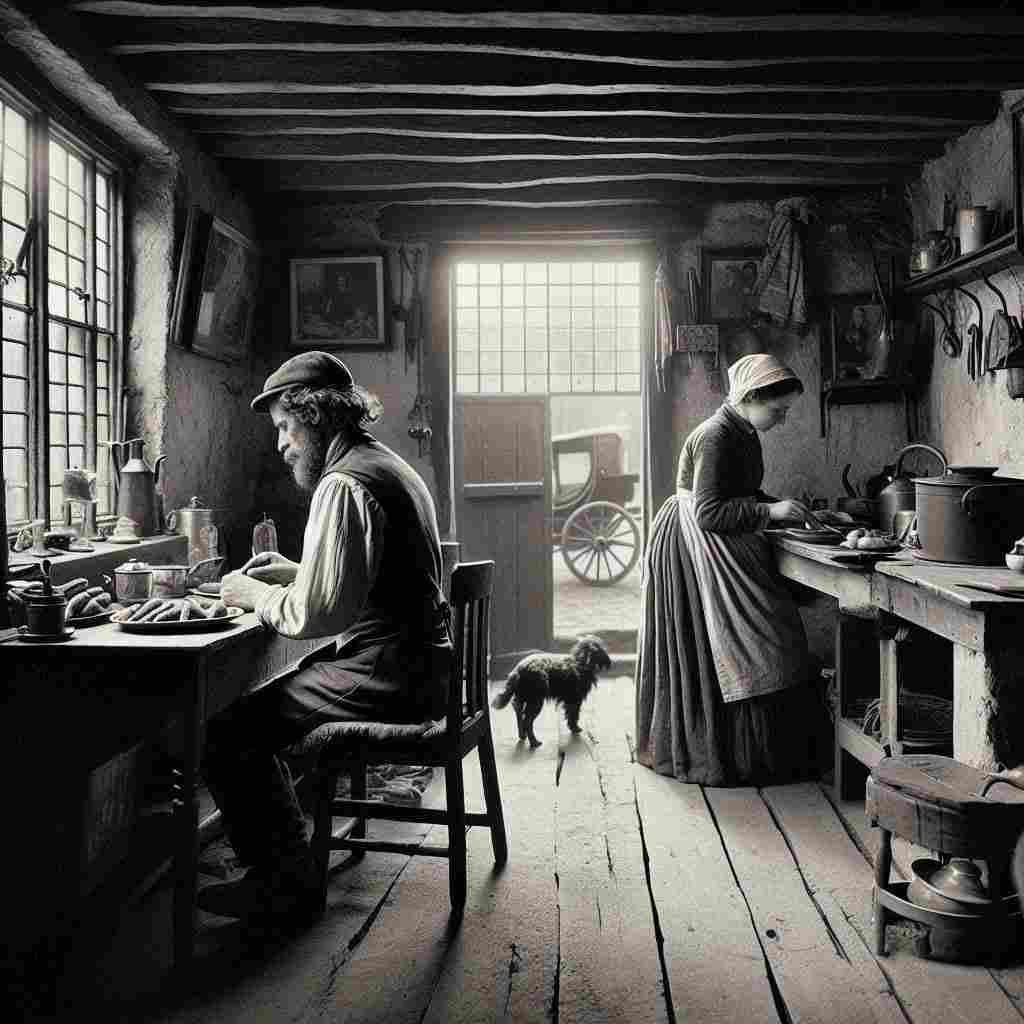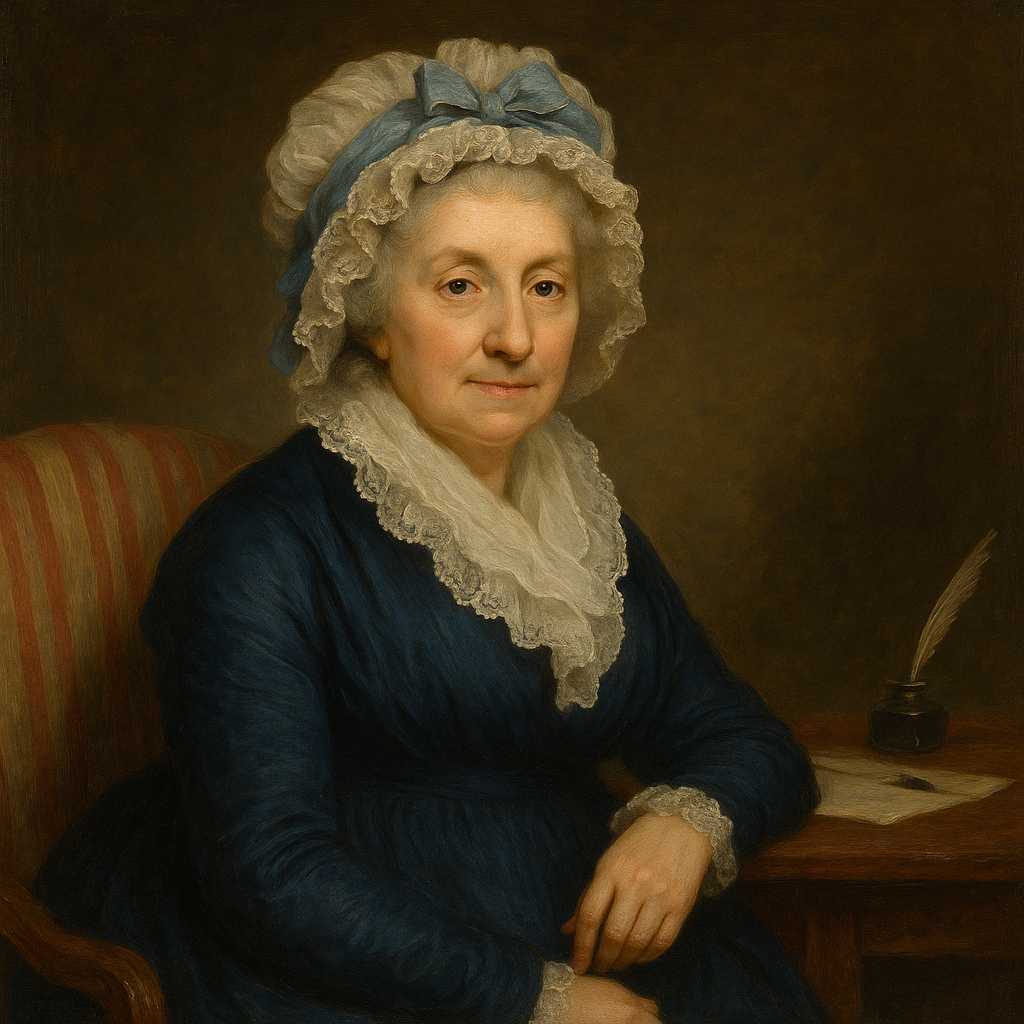The Hackney Coachman
Hannah More
1745 to 1833

I am a bold Coachman, and drive a good hack,
With a coat of five capes that quite covers my back;
And my wife keeps a sausage-shop, not many miles
From the narrowest alley in all Broad St Giles.
Though poor, we are honest and very content,
We pay as we go for meat, drink, and for rent;
To work all the week I am able and willing,
I never get drunk, and I waste not a shilling.
And while at a tavern my gentleman tarries,
The coachman grows richer than he whom he carries;
And I’d rather (said I), since it saves me from sin,
Be the driver without, than the toper within.
Yet though dram-shops I hate, and the dram-drinking friend,
I’m not quite so good but I wish I may mend;
I repent of my sins, since we all are depraved,
For a coachman, I hold, has a soul to be saved.
When a riotous multitude fills up a street,
And the greater part know not, boys, wherefore they meet;
If I see there is mischief, I never go there,
Let others get tipsy so I get my fare.
Now to church, if I take some good lady to pray,
It grieves me full sore to be kept quite away;
So I step within side, though the sermon’s begun,
For a slice of the service is better than none.
Then my glasses are whole, and my coach is so neat,
I am always the first to be called in the street;
And I’m known by the name (’tis a name rather rare)
Of the coachman that never asks more than his fare.
Though my beasts should be dull, yet I don’t use them ill;
Though they stumble I swear not, nor cut them up hill;
For I firmly believe there’s no charm in an oath
That can make a nag trot, when to walk he is loath.
And though I’m a coachman, I’ll freely confess,
I beg of my Maker my labours to bless;
I praise Him each morning, and pray every night,
And ’tis this makes my heart feel so cheerful and light.
When I drive to a funeral I care not for drink;
That is not the moment to guzzle, but think;
And I wish I could add both of coachman and master,
That both of us strove to amend a bit faster.
Hannah More's The Hackney Coachman
Introduction
Hannah More's poem "The Hackney Coachman: Or the Way to Get a Good Fare" presents a fascinating exploration of class, morality, and social critique in 18th-century England. Through the voice of a humble coachman, More crafts a narrative that challenges prevailing notions of virtue and success, offering a nuanced perspective on the complexities of urban life during the Industrial Revolution. This essay will delve into the poem's rich tapestry of themes, examining its linguistic features, historical context, and enduring relevance to contemporary discussions of labor, ethics, and social mobility.
Historical Context and Social Commentary
More's poem is firmly rooted in the socio-economic landscape of late 18th-century London. The hackney coachman, a figure ubiquitous in urban settings of the time, serves as a lens through which the poet critiques the broader society. The protagonist's proclamation, "I am a bold Coachman, and drive a good hack," immediately establishes his identity and pride in his profession, challenging the reader to consider the dignity of labor often overlooked by the upper classes.
The reference to "Broad St Giles" situates the poem in a specific London neighborhood known for its poverty and overcrowding. By placing her virtuous coachman in this setting, More subverts expectations and challenges the association between morality and social class. The coachman's contentment with his modest circumstances - "Though poor, we are honest and very content" - serves as a pointed critique of the excessive consumption and moral laxity often associated with the wealthy.
Character Development and Moral Philosophy
More's coachman emerges as a complex character, embodying a pragmatic morality that navigates the challenges of urban life while maintaining a strong ethical core. His declaration, "We pay as we go for meat, drink, and for rent," emphasizes fiscal responsibility and self-reliance, values that More likely saw as increasingly important in an era of rapid economic change.
The poem's exploration of temperance is particularly noteworthy. The coachman's assertion, "I never get drunk, and I waste not a shilling," positions him as a model of restraint in contrast to the "toper within" the tavern. This juxtaposition not only highlights the coachman's virtue but also serves as a critique of the drinking culture prevalent among both the working class and the gentry.
However, More resists presenting her protagonist as an unattainable paragon of virtue. The lines "I'm not quite so good but I wish I may mend; / I repent of my sins, since we all are depraved," acknowledge human fallibility while emphasizing the importance of continuous moral improvement. This nuanced portrayal adds depth to the character and makes his virtues more accessible to the reader.
Religious Themes and Social Responsibility
Religion plays a significant role in the poem, reflecting More's own evangelical beliefs. The coachman's assertion that "a coachman, I hold, has a soul to be saved" challenges class-based notions of spiritual worth, suggesting that divine grace is accessible to all, regardless of social standing.
The protagonist's commitment to attending church, even if only for "a slice of the service," demonstrates a genuine desire for spiritual nourishment. This portrayal counters stereotypes of the irreligious working class and suggests that piety can coexist with, and even enhance, one's professional life.
Moreover, the coachman's prayer for his labor to be blessed and his nightly expressions of gratitude present a model of how faith can be integrated into daily life and work. The resultant "cheerful and light" heart suggests that spiritual practice contributes to the character's overall contentment and moral fortitude.
Language and Poetic Technique
More's choice of the ballad form, with its simple rhyme scheme and regular meter, reflects the unpretentious nature of her protagonist. The use of colloquial language and specific professional jargon - "hack," "fare," "nag" - lends authenticity to the coachman's voice and grounds the poem in the realities of working-class London.
The poet employs several rhetorical devices to reinforce her themes. Antithesis is used effectively in lines such as "Be the driver without, than the toper within," creating clear moral distinctions. Repetition, as seen in the recurring phrase "Though poor, we are honest," emphasizes key virtues and creates a memorable refrain.
More's use of direct address, as in "boys, wherefore they meet," creates a sense of immediacy and draws the reader into the coachman's world. This technique, combined with the first-person narrative, encourages the audience to identify with the protagonist and consider his perspective.
Social Critique and Reform
While ostensibly a character study, "The Hackney Coachman" serves as a vehicle for More's social critique and reformist agenda. The poem challenges the notion that virtue is the exclusive domain of the upper classes, presenting a working-class character who embodies honesty, temperance, and piety.
More's coachman also models responsible citizenship. His avoidance of "riotous multitude[s]" and refusal to participate in "mischief" presents a contrast to the social unrest that characterized much of the period. This portrayal suggests that individual moral choices can contribute to broader social stability.
The poem's emphasis on fair business practices - "the coachman that never asks more than his fare" - and humane treatment of animals - "Though my beasts should be dull, yet I don't use them ill" - advocates for ethical conduct in professional life. These themes resonate with More's broader concerns about social reform and the moral improvement of society.
Conclusion
Hannah More's "The Hackney Coachman" is a nuanced exploration of morality, class, and social responsibility in 18th-century England. Through her sympathetic portrayal of a working-class protagonist, More challenges prevailing attitudes about virtue and social status, offering a vision of moral excellence that transcends class boundaries.
The poem's enduring relevance lies in its exploration of universal themes: the dignity of labor, the importance of ethical conduct in professional life, and the role of faith in shaping character. More's coachman, with his pragmatic approach to morality and his integration of spiritual practice into daily life, offers a model of virtue that remains compelling in our contemporary context.
As we continue to grapple with issues of social inequality, labor rights, and ethical business practices, "The Hackney Coachman" invites us to reconsider our assumptions about the relationship between social class and moral worth. It challenges us to recognize the potential for virtue and wisdom in unexpected places and to strive for a society that values character over status.
In its fusion of social commentary, moral philosophy, and poetic craft, More's poem stands as a testament to the power of literature to illuminate social issues and inspire reflection on the nature of virtue in a complex world. It remains a valuable text for scholars and general readers alike, offering insights into the social dynamics of 18th-century England while speaking to enduring questions of human nature and moral responsibility.
This text was generated by AI and is for reference only. Learn more
Want to join the discussion? Reopen or create a unique username to comment. No personal details required!



Comments
No comments yet. Be the first to comment!